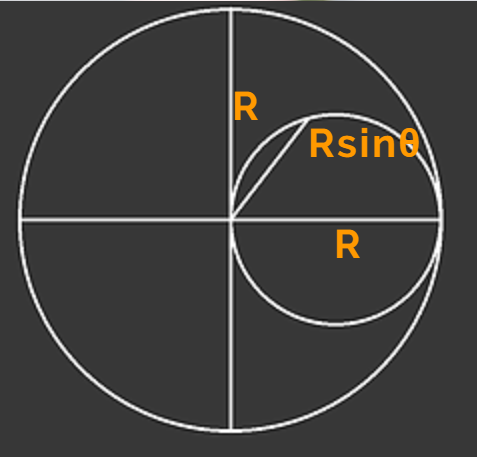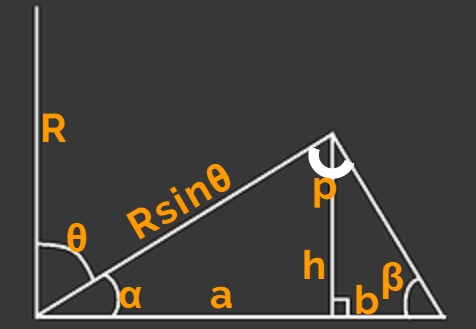Sine Circle
- XR_XharpRazor
- Aug 25, 2021
- 2 min read
Updated: Jan 19
M2007U-E2016-A2017-S2017-M2021_20180508x01

Let's draw a circle with a radius of R
and mark out all the angles with a factor of 5 degrees around the circle as the diagram shown on the right.
now let's mark out all different radii with a length of (R x the sine of the angle the radius is pointing to) from the center.
you'll find that the tips of those radii are likely to form a circle, the target of this article is to prove that the tips of the radius are really forming a circle.
Proofing
first, let's name the important parts of the setup:
R is the length of the radius of the big circle,
R = a + b
θ is the angle which the radius is pointing to,
Rsinθ is the length of the dynamic radii you've drawn
the angle p is the one attached to the "likely circle"
to prove the "likely circle" is a circle, we just need to prove the angle p is a right angle.
first we need to define the range of θ, α, and β
in this case
0° ≤ θ ≤ 180°
0° ≤ α ≤ 90°
0° ≤ β ≤ 90°
from the diagram, we know that
∵ cosα = a / Rsinθ ..... equation (1)
∴ a = R ⋅ sinθ ⋅ cosα
∵ tanα = h / a ..... equation (2)
∴ h = a ⋅ tanα
∵ α + θ = 90° ..... equation (3)
∴ sinα = cosθ
∴ cosα = sinθ
starting with
tanβ = h/b
tanβ = (a ⋅ tanα) / b ..... from equation (2)
tanβ = (a ⋅ sinα) / (b ⋅ cosα)
sinβ / cosβ = (R ⋅ sinθ ⋅ cosα ⋅ sinα) / (b ⋅ cosα) ..... from equation (1)
cosβ / sinβ = (b ⋅ cosα) / (R ⋅ sinθ ⋅ cosα ⋅ sinα)
b = (cosβ)(R ⋅ sinθ ⋅ cosα ⋅ sinα) / (sinβ ⋅ cosα)
b = (cosβ/sinβ) ⋅ R ⋅ sinθ ⋅ sinα ..... equation (4)
from
R = a + b
R = R ⋅ sinθ ⋅ cosα + (cosβ/sinβ) ⋅ R ⋅ sinθ ⋅ sinα ..... from equation (1) and equation (4)
1 = sinθ ⋅ cosα + (cosβ/sinβ) ⋅ sinθ ⋅ sinα
1 = sinθ ⋅ sinθ + (cosβ ⋅ sinθ ⋅ sinα)/sinβ
1 = sin²θ + (cosβ ⋅ sinθ ⋅ sinα)/sinβ
1 - sin²θ = (cosβ ⋅ sinθ ⋅ sinα)/sinβ
cos²θ = (cosβ ⋅ sinθ ⋅ cosθ)/sinβ ..... equation (3)
cosθ = (cosβ ⋅ sinθ)/sinβ
cosθ / sinθ = cosβ / sinβ
tanθ = tanβ
θ = β
from
α + β + p = 180°
α + θ + p = 180°
90° + p = 180°
p = 90° ..... (proofed)
Usage
by measuring the length of Rsinθ and R and a simple calculator,
we can calculate the value of sinθ approximately:
the length of Rsinθ / the length of R = the value of sinθ

.png)







Comments